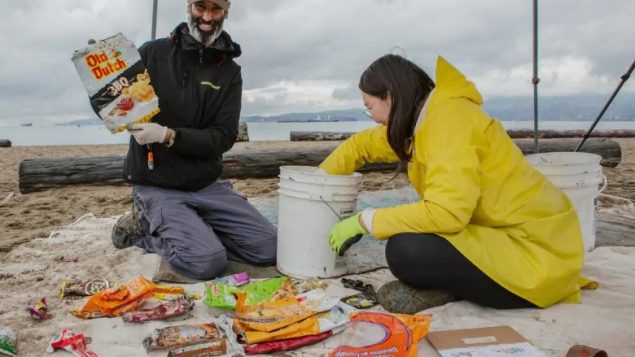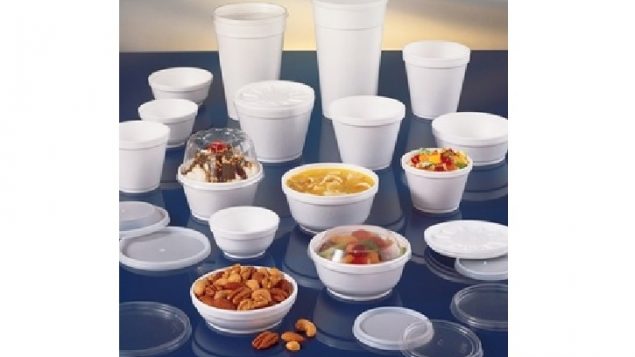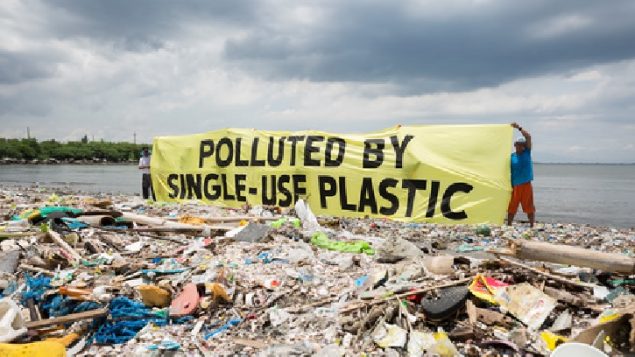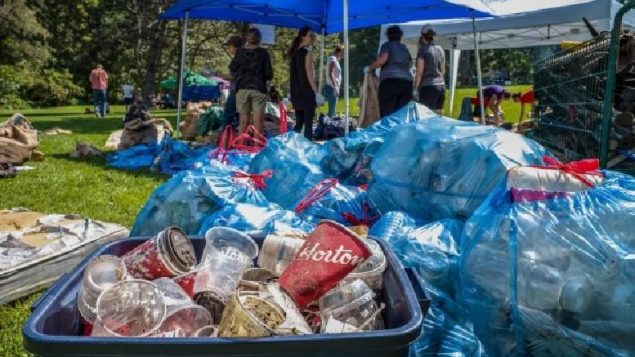Plastic garbage is everywhere.
You probably heard of the giant “Pacific gyre” a massive accumulation of plastic waste in the ocean. Microplastic waste with its still as yet not fully understood negative implications can be found in every water body in the world even in the Arctic ice.
An international movement called Break Free from Plastic, involving environmental groups in 42 countries recently began audited the waste plastics it collected in terms of the companies who market the products.

Volunteers go through food wrappers found on a beach in Vancouver during World Cleanup Day. Food wrappers were the top branded item found. (Amy Scaife/Greenpeace)
Coca Cola, PepsiCo, and Nestlé
In 239 cleanup efforts, plastic containers from those three multinationals were found to be the most common. The audits then named Danone, Mondelez International, Procter & Gamble, Unilever, Perfetti van Melle, Mars Incorporated, and Colgate-Palmolive were the most frequent multinational brands collected in cleanups, in that order.

Usually “unbranded”, polystyrene food containers are very common world-wide but generally not recyclable, (Canadian Plastics Industry Assoc)
In Canada, Greenpeace organised cleanups in four major Canadian cities along lake and ocean shores, Vancouver on the west coast, Toronto and Montreal, and Halifax on the east coast. It was in conjunction with “World Cleanup Day” on September 15.
YouTube- Break Free From Plastic- plastic garbage cleanup
They then conducted a brand audit of the thousands of litres of trash which included single-use plastic food wrappers, plastic bottles, plastic-lined coffee cups, shopping bags, and other non-branded, plastic lids, bottle caps, straws, stir sticks and more.
Of the 10,000 litres of trash, about 75 per cent was plastic and 2,231 pieces had identifiable branding.
In Canada, the top brands of garbage in order
- Nestle (pure life bottled water)
- Tim Horton’s (fast food chain)
- MacDonald’s (fast food)
- Starbucks (coffee)
- Coca Cola.

Freedom Island Waste Clean-up and Brand Audit in the Philippines Sept 14,2017 (Greenpeace)
In response to a CBC request for comments from the major companies, all said they were concerned and working on solutions to reduce their environmental footprint and on making all packaging recyclable. However, Nestle also suggested the audit showed there was a need for better waste management.
While improving recycling is always desirable, Greenpeace notes that even recyclablesingle-use products have an environmental footprint. Noting that consumers simply don’t have a lot of choice regarding single use plastics and Greenpeace is encouraging companies to develop re-usable containers and other options.
Additional information-sources







For reasons beyond our control, and for an undetermined period of time, our comment section is now closed. However, our social networks remain open to your contributions.